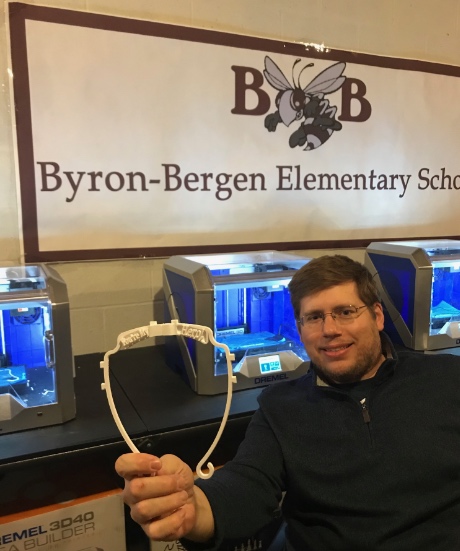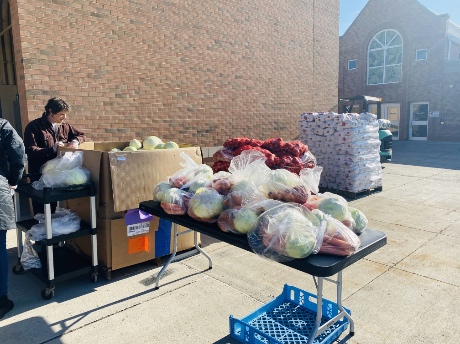What was advertised as a public hearing on incentives being offered by the Genesee County Economic Development Center to the developer of the Excelsior Solar Project in the Town of Byron turned out to be an opportunity for parties on both sides of the issue to re-emphasize their positions.
During the 25-minute videoconference, Mark Masse, GCEDC’s senior vice president of operations, read written statements from representatives of three farms who are leasing land for the 280-megawatt, 1,600-acre system -- Star Growers Land LLC; L-Brooke Farms and Colby Homestead Farms.
Their comments supporting the project – a huge financial windfall for the Town of Byron, Byron-Bergen Central School District and Genesee County, plus the creation of 290 full-time equivalent jobs – were followed by an oral statement from Eric Zuber, Byron town councilman and community farmer, who has opposed the plan since it was introduced more than two years ago.
Excelsior Energy, a subsidiary of NextEra Energy Resources LLC of Vero Beach, Fla., has plowed ahead under the authority of Article 10 of the New York State Public Service Law, while committing to pay the aforementioned taxing jurisdictions upwards of $44 million over the next 20 years.
The solar company is proposing to invest $345.55 million in a utility-scale solar project on multiple properties (46 parcels to be exact). It also has negotiated 20-year tax and community host agreements, including payments of $6,500 per megawatt, with a 2-percent annual escalator, to the county, Town of Byron and the Byron-Bergen school district.
$1.82 Million to Entities in Year One
What that means during year one, according to figures provided by the GCEDC, is that Genesee County would receive $281,775, the Town of Byron $862,522 and BBCS $675,703. That initial $1.82 million outlay would increase by 2 percent for each year after that for 20 years.
In return, the solar company has requested that the GCEDC approve property tax abatements estimated at $21,498,313 over that period and sales tax abatements (for construction materials) estimated at $11,288,287.
For its role as facilitator, the GCEDC receives a 1.25-percent fee – in this case, $4,319,458, which it will collect at the time of the financial closing.
Furthermore, farmers will stand to profit significantly through the leasing contracts they signed with Excelsior Energy.
Participants include Legacy Lands, LLC; Brooke-Lea, LLC; Call Lands; Lea-View Farms, LLC; Richard Colby; L-Brooke Farms, LLC; John Starowitz; Leo Starowitz Jr.; Star Growers Land LLC; John Starowitz and Andrew Starowitz; John Sackett Jr. and Charles Sackett; CY Properties LLC; and Call Lands Partnership.
Farm Reps Applaud Solar Project
In their written statements to the GCEDC board, Barbie Starowitz of Star Growers Land LLC; Jim Vincent of L-Brooke Farms, and Richard Colby of Colby Homestead Farms touted the project’s benefits for the Byron community and positive impact on the future of farming.
“The Excelsior Energy Center not only will support our farm for generations to come but also will provide new local revenue and new local jobs for our community,” Starowitz wrote, adding that the EEC has committed to hiring 90 percent of the employees (except for construction project management) from the local labor force.
Starowitz said diversification is crucial to today’s farmers.
“Farmers are trying to diversify so they can continue to stay in business in the future. Each crop year, we rely heavily on the weather. But for too many years it was either too wet or too dry. Crops have been suffering, low yields, bad quality and so on. But the farmer must still come up with the money to pay the expenses,” she wrote.
Her statement indicated that clean solar energy will help the farms to survive by reducing “economic pressures faced by farmers and encourage an approach that does not permanently remove land from agricultural production.”
She concluded by recognizing Excelsior’s “commitment to community input” by hosting monthly meetings at the Byron Hotel and reaching out to residents through other means.
“The Byron community of over 2,300 can all benefit from the solar project, working together as a positive thing for the community and future generations,” she wrote.
'Vehicle for Long-term Reinvestment'
Vincent said he and his affiliates “are advocates of green energy, innovative technology and the many advantages the Excelsior Solar Project represents, and not just because of having some of our lands involved in these solar leases … but what this means to our farm business model, providing a vehicle for long-term reinvestment, succession planning and diversification.”
He wrote that commodity prices, global trade policy, diminishing labor pool, government regulation and an unfair tax burden are making life difficult for farmers, and added that “alternative sources of income are absolutely essential if our farm businesses and the associated land base are to be sustained and provide for future generations.”
Colby wrote that while his farm is “still going strong,” technology has brought about changes to land use and the “viewscape” in the Town of Byron.
“Today, every home I know of in Byron has electricity. One hundred years or so ago, no one had electricity in their home. The Excelsior Energy Center is a good and necessary change in revenue and new local jobs for our community,” he submitted.
He acknowledged that property values could decrease, but the funding provided to the town, county and school district will be a game-changer.
“This will enable many public enhancements to the community, which, I believe, will drive up the values and make it not only that people want to live but also stay in Byron,” he wrote. “It may be a short-term inconvenience but a significant boon to local businesses – restaurants, et cetera. I see it as adding a bit of excitement to the town.”
He contends that the solar panels will cover less than half of the project’s fenced area, and much of his land will be “highly accessible along existing roads.”
In closing, he wrote that he is researching other uses for the land, including U-pick fruits and nursery stock, and even installing a hops yard to have a locally sourced input for beer brewing.
Zuber: It's Bad for the Environment
Zuber, a member of Byron Association Against Solar, then joined the meeting – expressing his dissatisfaction with GCEDC and Excelsior’s handling of the public hearing. He said he was unaware up to a half hour before the videoconference that he had until last Friday to submit written comments about the project.
“It seems like, and it isn’t quite right, that the people that are pro-solar had the opportunity to write in comments and now the comment period is over, and we were unaware of it,” he said. “I guess I knew this was going to take place, but I didn’t know the format (of how) it would work … and that has been quite typical since this whole thing started with the COVID. The transparency to communicate Excelsior’s plans is at best poor.”
Communication problems aside, Zuber said the solar project will harm the environment and will take away prime land needed to handle an increasing amount of manure.
“We’ve done an ag impact study, which the county apparently is not interested in. I am very concerned about the environmental situation,” he said. “Especially with the Cider project now coming out of the west (a similar project in the towns of Elba and Oakfield) … if the dairy industry is going to survive – I don’t see how it survives with these two big solar projects.”
Zuber said he also is concerned about waste generated by the food plants in Batavia.
“Right now, we’re spending $7 million at O-At-Ka (Milk Products) to handle the waste,” he said. “The city and the town are overwhelmed. We’re going to have the sludge come out of those plants (with) no place to go. The best place for it to go is where you’re putting these solar panels on the ideal ground … but I think the environmental (problems) are a very, very negative situation.”
'A Negative Carbon Effect on the County'
He also cited a university study that indicated that this project would have “a negative carbon effect on Genesee County.”
“This will make the carbon situation worse, does not accomplish anything that the global warming people want, and I think it is very poorly structured … I think it’s bad for the environment for the county, the town and probably the state.”
Starowitz then got on the call, rebutting Zuber’s remarks about the manure situation.
“… the gas from the manure is being pipelined directly into being sold on his property, which is located on Chapel Street Extension,” Starowitz said about Zuber’s operation. “Also, if there is concern for spreading manure on land that is now being put into solar ... I have addressed to him many times that we have farmland that would use his manure. To this day, he has not taken advantage of that. So, there are other options and other farmland for his concern of spreading manure.”
Looking ahead, the state Department of Public Service has scheduled a public statement hearing – a key step toward the end of the Article 10 process – for June 1 via teleconference from New York City with Administrative Law Judge Gregg Sayre presiding.
Previously: Byron 'mega' solar project moves forward despite opposition; virtual open houses scheduled for Aug. 31
























